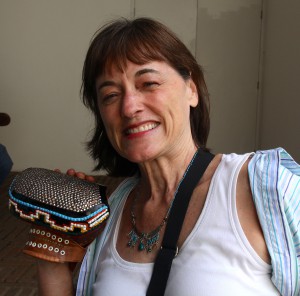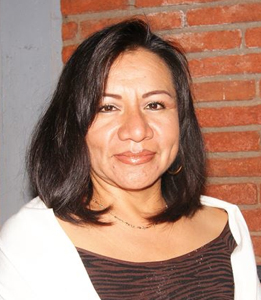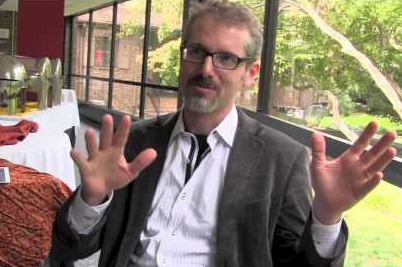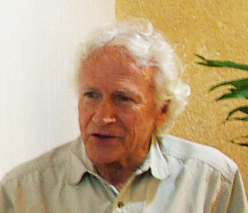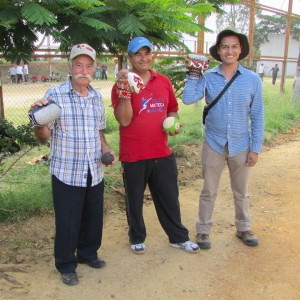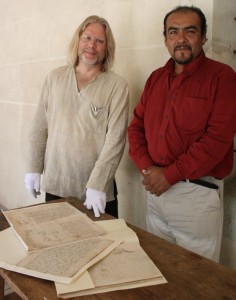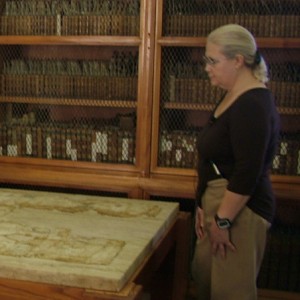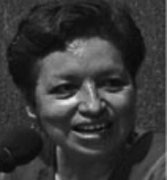Director
Stephanie Wood is an ethnohistorian of Mesoamerica, specializing in colonial Mexico, and she serves as the Director of the Wired Humanities Projects at the University of Oregon. She designed the NEH Summer Institute in Oaxaca, which we have held in 2010, 2011, and 2014. In 2010 and 2012 she organized Mesoamerican symposia in Warsaw and Vienna. Stephanie is responsible for writing the NEH grant proposal to fund the institute, developing the curriculum and syllabus, the website, the classroom and lodging spaces, plus the invitations and coordination of the speakers (whether other Oregon faculty or our local voices from Oaxaca). She will also lecture or co-lecture on several occasions. Dr. Wood has been working in this field of study for over 30 years and has spent a great deal of time in Mexico and, perhaps more importantly, in Oaxaca. If you’d like to get to know Stephanie in advance of the institute, you might visit this streaming interview with her about an online indigenous-language dictionary she is building in collaboration with a team of native speakers in Zacatecas, Mexico. In another streaming interview she speaks about the importance of the Burgoa Library and indigenous-authored manuscripts. Or, take a look at this film clip where she is speaking about some stone carvings in Monte Albán, Oaxaca. Finally, in this video we learn about her involvement in a project to publish a handbook and develop curriculum that re-thinks the Lewis and Clark Trail, Honoring Tribal Legacies. Here is her online c.v.
Local Logistical Facilitator
Isabel (“Bertha” — pronounced BARE-tah) Flores will assist us all with local arrangements. She knows the lay of the landscape, local cultural traditions, and how to move about the city and the state. A native Oaxaqueña, Bertha has worked for our co-sponsoring institution, the Alfredo Harp Helú Foundation, and has worked directly with our archaeologist, Professor Ron Spores, for several years and at various archaeological sites. This will be her third year working with the NEH Summer Institute in Oaxaca. Bertha will help us to successfully navigate excursion arrangements. She also helps with the procurement of spaces for our meetings, with communications with some of our speakers, and she provides lodging advice, medical interpretation needs, and a host of other things. We could not do this without Bertha’s crucial assistance in so many areas.
Master Teacher & Informal Nurse
Jerilyn Lancaster (left) attends our sessions and accompanies us on excursions as an “informal nurse,” to help comfort members of the group when health issues arise. She will also make house calls when you might need someone to bring you supplies or make a pharmacy run, should stomach issues arise. And she helps with disinfecting fruits and vegetables for the welcome and farewell parties. Ron Lancaster (right), truth be told, is not entirely comfortable with the title “master teacher,” preferring that you all think of yourselves as the masters, the ones who are hard at work in the classrooms, making education a reality. And yet we cannot help but recognize the wisdom he has derived from his years of experience as both a teacher and a teacher trainer at the university level. He is great at facilitating our conversations about pedagogy and ideas for teaching about Mesoamerican cultures in U.S. classrooms. He will preside over our “home room” sessions (where we will discuss readings and review Institute content, in general), and he will accompany us on excursions. He will be there to assist with particular projects on the optional Friday sessions, and he will provide feedback in writing and orally when you give us glimpses of your new curricular designs leading up to and during Week 4. Ron is great fun on the weekends, too, and he encourages you to seek him out outside the usual framework and bounce ideas off of him.
Additional Presenters and Their Topics (in chronological order)
Linguist
Michael Swanton is the general manager of the new Centro Académico y Cultural de San Pablo, where we will hold our sessions, in the historical center of Oaxaca. The site of the center is a sixteenth-century Dominican monastery, which was renovated over a period of six years with funding from Michael’s employer, the Fundación Alfredo Harp Helú. This new center’s purpose is the teaching and promotion of indigenous languages through seminars, workshops, conferences, and exhibitions. Michael is one of the best known linguists working with indigenous languages in Oaxaca, including the very much endangered Ixcateco. He will speak with us about language diversity in Oaxaca, which is striking and will give us a sense of the variety of indigenous cultures and their longevity in this region.
Archaeologists
Ron Spores is our resident archaeologist and core faculty for Week 1. Ron is a specialist in the Mixtecs of Oaxaca. He has spent his entire adult career devoted to archaeological digs, manuscript research, writing, and teaching about Oaxaca. Retired now from Vanderbilt University, Ron divides his time between the coast of Oregon and the Mixteca Alta, where he continues to work in archaeology and ethnohistory. He is currently working on a colonial site in Yanhuitlán, the home of an indigenous ruler who lived through the transition to Spanish rule.
Leobardo Daniel Pacheco Arias works at the archaeological site of Atzompa. But he comes from a long line of ballgame enthusiasts that includes his grandfather and father. He will speak to us about the ballgames of antiquity and one or more that are still played in the modern day in and beyond Oaxaca.
Ethnohistorians
Bob Haskett is an ethnohistorian and an expert in manuscripts authored by Nahuas from the sixteenth through the eighteenth centuries. He is the author of Indigenous Rulers: An Ethnohistory of Town Government in Colonial Cuernavaca (1991) and Visions of Paradise: Primordial Titles and Mesoamerican History in Cuernavaca (2005). He teaches Latin American history at the University of Oregon. He will speak to us about the Spanish Conquest, giving attention to myth-busting and to indigenous perspectives on the transition to Spanish colonial rule.
Bas van Doesburg is originally from the Netherlands, and took part in the seminar of Maarten Jansen at the University of Leiden, where his mentor continues guiding projects about indigenous communities of Oaxaca and Mesoamerica, more broadly speaking. Until recently, Bas was the director of the Museum of the City of Oaxaca. He left that position to devote more time again to his research in ethnohistory. He is now with the Centro Académico y Cultural San Pablo, and is affiliated with Córdova Library there, the Burgoa Library in the Centro Cultural de Santo Domingo, and the Universidad Nacional Autónoma de México. In the photo (borrowed from the Internet), Bas appears with a person who recently donated to the Burgoa Library some colonial manuscripts with information about a cacique of the Mixtec Baja. On July 14–17, Bas will guide us in an excursion to see an archive in Teposcolula and introduce us to local, indigenous-authored manuscripts and how we might intepret them.
Manuscript Restoration
María del Refugio (“Cuquita”) Gutiérrez Rodríguez. On July 13th we will hope to meet the manuscript restoration technician at the Biblioteca Francisco Burgoa in the Santo Domingo Cultural Center, who will talk about and demonstrate key processes in the restoration of badly damaged pictorial and textual manuscripts, including perhaps some manuscript she is currently restoring or has recently finished. The Burgoa helps in their preservation and repatriation of manuscripts to the communities from which they came and whose stories they tell.
Cooking Instructor
Magda Girón (forthcoming)
Ethnobotany Guide
Diego Sánchez (forthcoming)
Anthropology and the Arts
Lynn Stephen, a Distinguished Professor of Anthropology from the University of Oregon, will lead a series of community and studio visits where we will learn about indigenous arts, such as textiles and pottery, both traditional (showing continuities) and with a more modern twist. We also hope to take in a bilingual school while in one of these communities and visit at least one studio where we will learn about the production of street art. The goal is to see how indigenous people live and work today in towns near Oaxaca City.
Paco González (forthcoming)
Zeferino Mendoza (forthcoming)
Richard Hanson (forthcoming)
Marietta Bernstorff (forthcoming)
Gabriela Salomé Loaeza Santos (forthcoming)
Film
Gabriela Martínez will be providing the leadership for our film week (Week 4). She is a professor of Journalism and Communications at the University of Oregon. We will be treated to her documentary film Women, Media and Rebellion in Oaxaca (2008) about the takeover of the Oaxacan television and radio stations during the teachers’ strike and subsequent social and political movement in 2006. These events had a significant meaning for mestiza and indigenous women. On Wednesday night, we will have the premier of her recent documentary, Keep Your Eyes on Guatemala, about the importance of documents, testimonials, and forensic archaeology in proving acts of genocide against Maya communities the early 1980s in that country. Gaby has also provided us with access to a number of short films about Oaxaca (on her own YouTube channel) that might be useful in your classrooms.
Concepción (“Conchita”) Núñez will, on Monday July 28th, show us Deshilando condenas, bordando libertades (2005), a prize-winning documentary, 35 minutes, with and introduction and Q/A period led by the filmmaker, with interpretation by Gabriela Martínez. Synopsis: This film explores the sad story of indigenous women imprisoned in Oaxaca over many years for drug trafficking, in many cases having been duped by a relative into carrying a suitcase by bus to Mexico City, not knowing it contained marijuana or another substance. The filmmaker will provide an update after the film about the eventual fate of the women.

